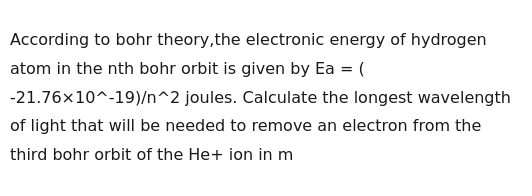Question
Question: According to bohr theory,the electronic energy of hydrogen atom in the nth bohr orbit is given by Ea...
According to bohr theory,the electronic energy of hydrogen atom in the nth bohr orbit is given by Ea = ( -21.76×10^-19)/n^2 joules. Calculate the longest wavelength of light that will be needed to remove an electron from the third bohr orbit of the He+ ion in m

2.05 × 10^{-7} m
Solution
The energy of an electron in the nth Bohr orbit for a hydrogen atom is given by:
En=n2−21.76×10−19 Joules
For a hydrogen-like ion with atomic number Z, the energy of the electron in the nth Bohr orbit is given by:
En=n2−21.76×10−19×Z2 Joules
For the He+ ion: Atomic number (Z) = 2 The electron is in the third Bohr orbit, so n = 3.
Substitute these values into the energy formula:
E3(He+)=(3)2−21.76×10−19×(2)2
E3(He+)=9−21.76×10−19×4
E3(He+)=9−87.04×10−19
E3(He+)=−9.67111...×10−19 Joules
To remove an electron from an orbit, the energy supplied must be equal to the ionization energy from that orbit. The ionization energy is the negative of the electron's energy in that orbit (as the energy of a free electron at infinity is considered zero).
Energy required (Erequired) = −E3(He+)
Erequired=−(−9.67111...×10−19)
Erequired=9.67111...×10−19 Joules
This energy corresponds to the energy of the photon needed to remove the electron. The relationship between photon energy (E), Planck's constant (h), speed of light (c), and wavelength (λ) is given by:
E=λhc
We need to find the longest wavelength, which corresponds to the minimum energy required to remove the electron. Rearranging the formula to solve for λ:
λ=Erequiredhc
Using standard values for Planck's constant (h) and the speed of light (c):
h = 6.6×10−34 J s (as used in the similar question's solution for consistency) c = 3×108 m/s
Now, substitute the values into the equation for λ:
λ=9.67111...×10−19 J(6.6×10−34 J s)×(3×108 m/s)
λ=9.67111...×10−1919.8×10−26
λ=2.047368...×10−7 m
Rounding to three significant figures, the longest wavelength of light needed is:
λ≈2.05×10−7 m
